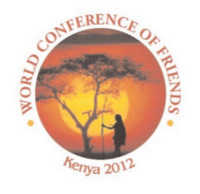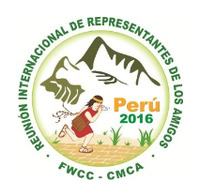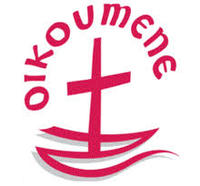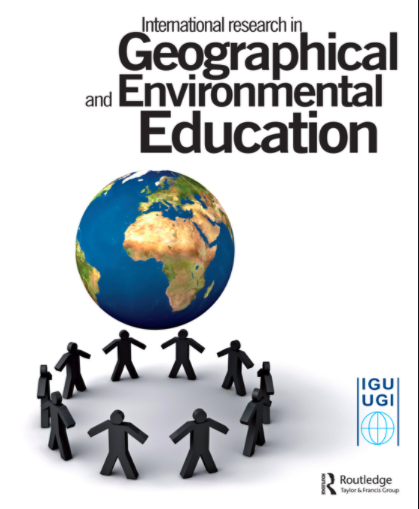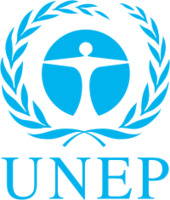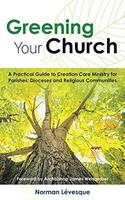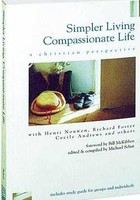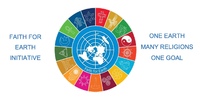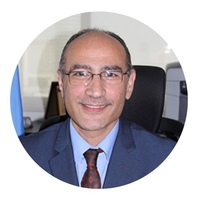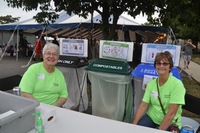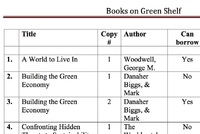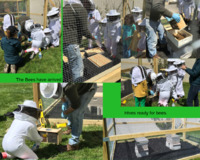Search
176 items
-
A Quaker Response to the Crisis of Climate Change
A Quaker Response to the Crisis of Climate Change discusses how climate change and consumer waste negatively impacts disadvantage populations the most. The first two paragraphs of the introduction are stated below:
"The crisis of global climate change represents a supreme test of humanity’s collective wisdom and courage. Our immoderate use of the Earth’s resources violates the entire biosphere, threatening the lives of millions of people and the habitats of thousands of species. Many of the poorest people are already suffering a changed climate; they are
asking us all to act.
How has humanity produced this crisis? Our faith response is that prevailing social values have obscured what it means to live authentically on this Earth. In rich European countries we consume more than we need within an economic system that divides us as a society; in much that we do, we cause harm to the planet and each other without enriching our lives." -
The Kabarak Call for Peace and Ecojustice
The Kabarak Call for Peace and Ecojustice, at the World Conference of Friends in 2012, maintains that we live in times in which the Earth can not replenish itself, so we must intervene where we can. In addition, we need to look out for our fellow humans, especially those who are less fortunate than us. The following paragraph provides the introduction to the text:
"In past times God’s Creation restored itself. Now humanity dominates, our growing population consuming more resources than nature can replace. We must change, we must become careful stewards of all life. Earthcare unites traditional Quaker testimonies: peace, equality, simplicity, love, integrity, and justice. Jesus said, 'As you have done unto the least… you have done unto me'. We are called to work for the peaceable Kingdom of God on the whole earth, in right sharing with all peoples. However few our numbers, we are called to be the salt that flavours and preserves, to be a light in the darkness of greed and destruction."
-
FWCC Sustainability Minute
This minute was drafted at the FWCC World Plenary in Pisac, Peru in January 2016. These excerpts provide some salient points on sustainability/request by the Quakers who were involved with its creation:
"Invest FWCC World funds ethically. Share Quaker experiences with other faith groups to inspire them to action, especially through the World Council of Churches. Seek ways of connecting Friends worldwide that are sustainable. Facilitate dissemination of training materials on sustainability issues for Quaker leaders, pastors and teachers."
"Initiate at least two concrete actions on sustainability within the next 12 months. These may build on existing projects of individuals or monthly meetings or they may be new initiatives. We ask that they encourage Young Friends to play key roles. We ask that meetings minute the progress and results, so as to share them with FWCC and Quaker meetings. Support individuals and groups in their meetings who feel called to take action on sustainability. Support the work done by Quaker organisations such as the Quaker United Nations Office and the Quaker Council for European Affairs to ensure that international agreements and their implementation support sustainability." -
The United Church of Christ and Climate Change
This article from the United Church of Christ points to specified time periods/salient highlights of their responses to various environmental issues over the past 15 years. The United Church of Christ recognizes climate and energy issues as moral and ethical issues that affect everyone. However they also acknowledge that it most negatively impacts those with the least access to resources. -
World Council of Churches Endorses Fossil Fuel Divestment
This message from the World Council of Churches (WCC) discuss their endorsement of fossil fuel divestment (2014 Geneva, Switzerland). WCC is one of a growing number of religious groups to support the fossil fuel divestment movement. The introduction is stated below:
"The Central Committee of the World Council of Churches (WCC), a fellowship of over 300 churches which represent some 590 million people in 150 countries, endorsed fossil fuel divestment this week, agreeing to phase out its own holdings and encourage its members to do the same." -
How do we Communicate Environmental Ethics? Reflections on Environmental Education from a Kuwaiti Perspective
Dr. Khadija al-Naki, an educational researcher, discusses Islamic thought in relation to environmental education. Comparing Islamic teachings with Western environmental ethics, al-Naki opens a conversation on how to develop an environmental curriculum in Islamic education systems. This article leaves the reader questioning the role of education in the environmental movement.
Published in the journal International Research in Geographical and Environmental Education. -
Episcopal Church, Church of Sweden, ELCA commitment: "Sustaining hope in the face of climate change"
The heads The Episcopal Church, the Church of Sweden, and the Evangelical Lutheran Church in America (ELCA) signed a joint commitment to climate statement. The following are five salient points from their commitment:
"1) Advocate for national and international policies and regulations that enable a swift transition from dependence on fossil fuels to clean, safe, renewable energy, and for economic systems that are fair and just.
2) Sustain an interfaith, international conversation around climate change and social and economic justice while working to keep climate change in the public’s attention.
3) Encourage our faith communities to deeper theological reflection on the moral and ethical response to climate change, and then to make public witness about climate change through advocacy at the local, national and international levels.
4) Invite our communities to prayerfully consider how their own actions, lifestyle choices – particularly our energy consumption -- affect the environment.
5) Offer our communities continued opportunities to learn about climate change and the universal church’s response to this crisis." -
Coronavirus, Faith Leaders, and Sustainable Development
An event organized by the United Nations Environment Progamme and the Swedish International Development Cooperation Agency led a digital conference to discuss innovation to combat the environmental crisis in light of the COVID-19. The Faith for Earth Initiative calls for interfaith collaboration to combat environment problems. In the midst of a global crisis, the UN encourages this time to be used for innovation and educational progression. This quote from Iyad Abumoghi summarizes the mission:
“'The coronavirus pandemic is focusing hearts and minds, says the director of Faith for Earth, Iyad Abumoghli. “Faith for Earth is mobilizing youth, the leaders of faith-based organizations, as well as scientists and theologians to work together for innovative change to speed up sustainable development.'” -
Zero Net Energy Grants
The Mennonite Creation Care Network published information on how a Mennonite Church congregation can qualify and get approved for a grant from the Pam De Young Net Zero Energy Fund. The grant would allow congregations to install solar panels, car charging stations, or other sustainable improvements. Any Mennonite Church USA congregations willing to become more sustainable are eligible for the grant. -
Greening Your Church
"A Practical Guide to Creation Care Ministry for Parishes, Dioceses and Religious Communities," as this book's subtitle reads, author Norman Lévesque identifies and outlines strategies to creating environmentally friendly congregations. In 104 pages, learn about the theology of creation care ministry and how to green-ify your community to reduce impacts on God's creation. ISBN: 9782896466368 -
Simpler Living, Compassionate Life
Simpler Living, Compassionate Life features essays by Cecile Andrews, Henri Nouwen, Frederick Buechner, and many more authors. This collection touches on a variety of topics surrounding humanity’s relationship to our earthly home. In addition to the essays, the book includes 70 pages of additional material to help guide communities as they naviagate this book, making it a wonderful choice for book groups. -
Engaged Organizations: Lakeside Chautauqua
Lakeside Chautauqua is a community in Ottawa County, Ohio that borders on part of the Chautauqua Trail along Lake Erie. This organization is dedicated to preserving Lakeside's heritage since it's inception in 1873. While fostering Christian values, Lakeside provides opportunities for various intellectual, physical, and cultural experiences. Also included are sub-organizations that, among other things, are dedicated to knowledge of the environment, sailing, wooden boats, and tennis. The Lakeside Environmental Stewardship Society (LESS) is a group that coordinates educational programs and field trips to raise environmental awareness. These community group leaders hope to increase awareness of the environment for Lakeside Chautauqua guests and residents, as well as foster increased environmental activism as people return to their homes after their visit. -
Caring for Creation: Corner of Creation (Madison Christian Community)
Madison Christian Community offers a number of helpful resources for faith communities. One of the items is a “study-action” program that can support communities in reclaiming their sense of place. It is called “Caring for Creation: Corner of Creation.” -
United Nations Environment Programme Faith for Earth Initiative
Launched in November of 2017, the UN Environment Faith for Earth Initiative recognizes the social, economic, moral, and environmental influence of faith communities, and established the initiative to "strategically engage with faith-based organizations and partner with them to collectively achieve the Sustainable Development Goals (SDGs)." As stated on the initiative's webpage: "Faith for Earth has three main goals: to inspire and empower faith organizations and their leaders to advocate for protecting the environment, to green faith-based organizations’ investments and assets to support the implementation of SDGs, and to provide them with knowledge and networks to enable their leaders to effectively communicate with decision-makers and the public." -
Dr. Iyad Abumoghli
Dr. Iyad Abumoghli has more than 34 years of experience with international organizations, the private sector, and scientific institution. Dr. Abumoghli’s expertise focus on strategic planning, sustainable development, water resources management, and knowledge and innovation. Currently, Dr. Abumoghli is the Lead Principal Advisor on Engaging with Faith-Based Organizations at UN Environment. Previously Dr. Abumoghli held several leading positions including the Regional Director and Representative of UN Environment in West Asia 2012-2017, Director of Knowledge and Innovation at UNDP’s Regional Office in Cairo 2009-2012, Senior Environment Advisor at UNDP’s Sub-Regional Resource Facility in Beirut 2006-2009, Global Practice Manager for the Energy and Environment Group in New York 2003-2006, Assistant Resident Representative of UNDP in Jordan 1997-2003.
Dr. Abumoghli adopts a holistic multi-sectoral approach to development ensuring cross-thematic integration with internal and external partners.
Dr. Abumoghli holds a doctorate degree in Bio-Chemical Engineering from the University of Bath/UK, an outstanding graduate of the Virtual Development Academy – Johns University, and a BA in Chemical Engineering from University of Jordan. -
Congregational Profile: Our Lady of Perpetual Help, Grove City, OH: How it began in one parish
In 2016, prompted by Pope Francis’ encyclical “Laudato Si,” we at Our Lady of Perpetual Help Parish in Grove City, Ohio, held two 8-week sessions of discussions on the encyclical and at the end of the second session, our pastor, Fr. Daniel J. Millisor, appointed the discussion leader, Sister Nancy Miller, OSF as chairperson and called together a team to explore how the parish might lower our carbon footprint. The Creation Care Council (CCC) of our parish meets monthly for prayer, discussion and action in response to Laudato Si’s call for greater care for our common home.
We conducted a parish survey, with the intention of enhancing awareness among parishioners, as well as to determine if, and how, members were already incorporating recycling and composting into their daily lives. The results were highly, though not entirely, favorable. In addition to regularly inserting information and suggestions into our parish bulletins, taking the CCC members to tour a landfill, recycling plant, and the OSU Byrd Polar Research Center, we requested that all committees at the parish look at ways to reduce or eliminate their use of Styrofoam dinnerware. Rather than condemn polluters, we wrote thank you notes to businesses that showed environmental stewardship. We began annually purchasing and giving away seedling trees to plant on Earth Day. We took on trying to improve parish recycling efforts – providing new recycling containers for all parish offices, inviting a local official – an environmental expert – to explain to us what is and is not recyclable, preparing an interactive recycling quiz at the parish festival, and then attempting to bring recycling to the parish picnic and festival.
The efforts to incorporate recycling in parish events “failed” the first year, but we got it right the second year and this (the third) year, we successfully introduced food waste composting to Lenten Parish Fish Fry dinners, the Parish Picnic, and our largest parish event of the year: the Parish Festival. The 2019 Parish Festival served an estimated 5,000 meals, working with food vendors to increase their ability to serve compostable dishware and cutlery. In total, the CCC was able to divert 2,704 gallons of waste from the local landfill, which constituted 86% of all waste at the Festival.
We also exceeded all expectations in soliciting nearly 100 volunteers to help teach and monitor correct depositing of these materials - without tapping the usual volunteer corps that was still needed to keep the regular parts of the festival going. With the support of our pastor and dedicated CCC members, we’ve come a long way, and still feel like we have only just begun!
-
Parish Waste Reduction Program strategic plans at Our Lady of Perpetual Help (OLPH), Grove City, OH
This PDF copy of a powerpoint presentation contains the plans generated by the Creation Care Council of OLPH to launch a waste reduction program that has since become quite successful. Various levels of detail are contained in the slides, within a congregational creation care team meeting format; the planning process and details here can be helpful to similar efforts in other places. Note that the grant that this presentation mentions hoping to apply for was successfully gained (for $2000) to provide signage and other infrastructure to greatly empower this project. -
Creation Care Bookshelf book list
This file displays the Green Bookshelf book list of the creation care library at Our Lady of Perpetual Help parish in Grove City, OH. Each book in the collection is available in two copies - one copy that stays in the library, and a second copy that can be checked out and taken home (on an honor system) by members of the congregation. -
Group Profile: St Joseph Montessori School Laudato Si' Club and Honey Bee Project
A group of St Joseph Montessori School students were inspired by Pope Francis’ letter to the world called Laudato Si. In his letter, the Pope called for every person on the planet to live more simply, in harmony with nature, to care for each other and our common home. In other words, the Pope wants us to "bee-have" better towards our environment.
St Joseph Montessori students formed an Environmental Club called Laudato Si'. The club spent time researching Honey Bees, bee colony collapse, and the importance of bees. They decided they must do something. Students applied for grants, presented plans for two bee hives, an enclosure around the hives, and a pollinator garden to the school and Sacred Heart parish leadership. They required permissions to use school and church property for the bee hives. They even submitted plans to the local government, for approval.
They met with a bee-keeper to get some advice on building the hives. Throughout the winter months, they developed materials to share with the younger grade levels and during our Earth Day Celebrations on April 18, they presented to small groups within the school on bees and how they help the environment. The students passed out information flyers, along with wildflower seeds, to the surrounding homes explaining the bee hives and the importance of not treating their lawns with chemicals.
The Laudato Si Club evaluated the campus and identified an area where the bees would be able to co-exist with their surroundings but not interfere with the students and community. The area gets ample sunlight which will allow the bees to survive Ohio Winters. It is also elevated with a building nearby; this created a flight path for the bees that force them away from the playground and high foot traffic areas. It is also near an area of the school that has garden and flower beds that have been converted into pollinator gardens.
Now they manage two active hives of honey bees (St. Ambrose hive and St. Abigail hive) and a small pollinator garden, named after St. Kateri. We hope to have healthy bees -- and maybe some honey -- for years to come.
-
Denominational Policy Statement: Caring for Creation:Vision, Hope, and Justice
This is the general ELCA statement on faith and the environment, approved by the third Churchwide Assembly in 1993, in Kansas City, MO. -
Recycling Program at St Francis of Assisi, Columbus, OH
St Francis of Assisi has maintained a recycling program for the parish for many years. In the parish hall, there are three different colored bins to separate out paper, plastics, and metals. In the church parking lot, there is one bin for garbage and another bin for recycling. They have been working with Republic Services, Inc. to haul away recyclables and other waste. Through their contract, Republic currently accepts aluminum, glass and plastic items if each are bagged separately and placed in the recycling bin. Republic also provides contracts that allow for recyclable items to be collected all together.
-
Church Hall Sustainability Guidelines at St Francis of Assisi, Columbus, OH
This is a one-page list of guidelines created by the Creation Care Team at St Francis of Assisi to provide guidance for sustainable use of the parish hall; includes instructions about recycling, food waste, utensil use, energy use, etc. -
Bulletin Insert on Laudato Si'
This insert provides reminders for some of the salient principles of the Laudato Si' encyclical, including: caring for our common home as we are all connected; remembering the poor, who are more affected by environmental impacts; and protecting life in all it's forms. It also focuses on courses of action one can take to support these critical issues. -
Engaged Organizations: St. Vincent de Paul School, Mt. Vernon, OH
Creation care work at St Vincent de Paul School, Mt. Vernon, began in 2006 when the school received funding from the Knights of Columbus to purchase a dishwasher for their kitchen. Following this, the school began participating in the Hope Now program – an organization that provides used old donated doors to build tables. The school provides transportation to their annual K-6 field trip to The Brown Family Environmental Center at Kenyon College and their annual 5th grade summer camp through Lutheran Outdoor Ministries in Ohio (students take turns weighing food waste). Additional sustainability projects include collaboration with the parish and the local community. The school participated in an all-parish project through the Green Tree Plastics company’s A Bench for Caps sustainability program (students collected and sorted bottle caps in exchange for three benches). The school plans to create a grotto area using their three recycled benches. In order to foster green living and healthy community-school relations, the school provided planter flowers to local businesses.
Administrators at St. Vincent de Paul acknowledge the importance of maintaining social justice programs in accordance with Laudato Si's urgent message to care for the poor. Students from Beth’s Robinson's 6th grade social studies classes participate in a demographics project. Each year students select one continent, usually Africa, to learn more about the conditions of poverty. The class then raises money through various fundraisers and donate to parts of the continent through Catholic Relief Services. An upcoming project includes having students sew plastic bags together to create tarps to be donated to homeless shelters in the area.
-
Engaged Organizations: Springs Dominican motherhouse, Columbus, OH
The Springs Dominican motherhouse hosts 150 individuals (maintaining 76 beds). Initial green projects included replacing their lights with LED bulbs and replacing seven boilers, which had been there since the 1940s, with just one new one. Recently, Innovative Organic Recycling composting company had been invited to speak with house members, and their composting program took off from there. Jean Sylvester, Motherhouse Administrator, had found it easy to do at her own house and was also aware of Shepherd’s Corner success with it. Both staff and residents adapted quickly and the process is streamlined at this point. Composting is done by the sisters themselves, with administration providing the bags and cans. In addition to composting food, even the bones, all of plates and cups, including coffee cups, can be composted as well.
For administration, this is a business model that makes practical sense. Management had been quoted at $35 per pick up, so they decided to give it a two-week trial period. Overall, composting has been a "win-win" for them, with its ease of implementation and minimal ongoing efforts. In addition, their dock smells better because the food waste bags are not left open in the dumpster now. There is also less garbage for RUMPKE to take, so the project cost savings of waste management will be reaped over time .


